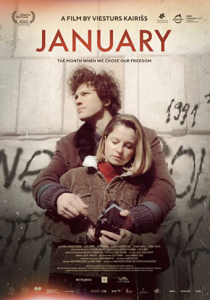
“January” (“Janvāris”)
(Latvia/Lithuania/Poland)
Screened at the Gene Siskel Film Center Chicago European Union Film Festival (2/5); Letterboxd (2/5), Imdb.com (4/10)
The 1991 independence movement led by the Baltic states of Lithuania, Latvia and Estonia in the days preceding the collapse of the Soviet Union was a dynamic but dangerous time in the re-emergence of those nations as sovereign states, a subject that has provided the basis for a growing number of recent cinematic releases. Because of these conditions, it was also a time when the citizens of those republics had no clear indication of what the future would hold. Could they successfully break away, or would they come under the harsh retribution of their superpower occupiers? And what did those residents think about these possibilities – should they support revolution or remain ostensibly loyal to those who could potentially crush them with little effort? When these circumstances are added to the personal uncertainty associated with someone who’s in the throes of coming of age, these questions loom even more profoundly. Such is the case in this historical drama about an aspiring young Latvian filmmaker (Karlis Arnolds Avots) looking to find himself amidst all of the surrounding chaos, both in his homeland and in neighboring Lithuania, either as an experimental auteur or a documentarian of what was transpiring around him. The protagonist also wrestles with an on-again/off-again romance involving a cinematic colleague (Alise Danovska), as well as his decision of whether or not to honor his Soviet conscription obligation. On the surface, all of this would appear to offer the makings of a powerful, compelling, first-class drama, but the unbalanced execution of writer-director Viesturs Kairiss’s narrative keeps the film from living up to that potential. The principal issue here is a story that takes far too long to get off the ground, incorporating a wealth of easily excluded extraneous material that adds little to capturing the character of the time and the merits of its associated scenario. And, when things finally do get on track, there’s a good chance viewer interest may have been lost long by that point (I know it was with me). It’s baffling that this offering was considered worthy enough to win the best international narrative feature at the 2022 Tribeca Film Festival, along other comparably dubious accolades. In short, this should have been a terrific picture, but, unfortunately, it represents a lost opportunity for telling an engaging story about a tense time and how a lost soul tries to find his place in it.




Leave A Comment